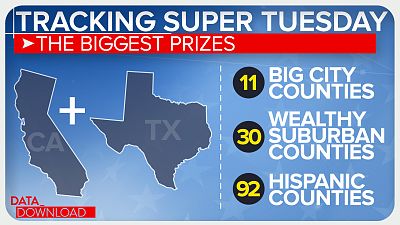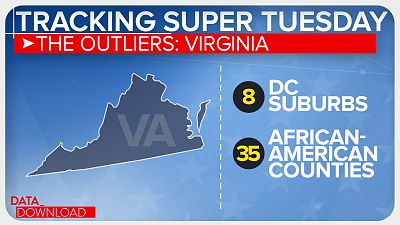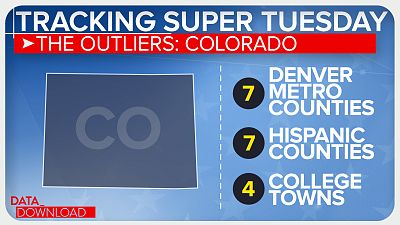Data Download has a look at primary votes within the Super Tuesday vote.
Super Tuesday is about more than just winning delegates, the complex mix of 14 states in play this week offers a look at how different important voting blocs feel about the Democratic field as the primary calendar picks up momentum.
With that in mind, using demographics and economics as a guide, Data Download has a look at primary votes within the Super Tuesday vote, with help from the county breakdowns of the American Communities Project at George Washington University. Consider this another way to watch the results as they are tallied Tuesday night.
Let's start with the two biggest prizes, California and Texas. Those two states will award some 643 delegates on Tuesday, but they are especially interesting because they hold three important kinds of voter communities.
There are 11 Big City counties in the vote in those states, from Houston to San Francisco, and they hold some 19.9 million voting-age people in them. Those places are densely populated (all at least 930,000 people); racially, ethnically and economically diverse; and they are consistently the strongest Democratic base in presidential races. They tend to be a bit more liberal than the party as a whole and could, maybe should, be good territory for Vermont Sen. Bernie Sanders.
Mostly clustered around those big cities are 30 wealthy suburban counties holding 9.4 million voting-age people. Those counties have seen their Democratic lean grow in recent elections. It's counties like these that propelled the Democratic wins in the 2018 midterms, but it is not yet known how they will respond to the Democratic field. If Sanders does well here, that's a good sign for him Tuesday night and beyond. These places tend to be a bit more moderate politically and may be looking for a more centrist option.w
And in Texas, the primary is open, while in California people without a party preference can vote in the Democratic primary. In both cases that could bring some moderate Republicans out to the polls.
These two states are also full of Hispanic Center counties, 92 in all, that have high numbers of Latino voters (the population in each is at least 28 percent Hispanic and the figures run up to 99 percent) and usually lower incomes. Sanders has made a point of courting these voters, especially in California, and the 5.5 million voting-age people in these counties should be good turf for him.
On the other side of the Mississippi, a collection of Super Tuesday states tests a different part of the electorate in Alabama, Arkansas and North Carolina.
These states stand out on Tuesday for their large African American populations, particularly in rural areas. There are 104 African American South counties holding 3.9 million voting-age people in these states. The population in the counties is between 15 percent and 82 percent African American and all have medians household incomes of less than $56,000. Former Vice President Joe Biden has been banking on these voters ever since he announced his run for the White House. Tuesday should tell us if and how well they come through for him.
These southern states have fewer big urban areas in them, but there are seven southern urban centers with more than 200,000 voting-age people in them from Pulaski in Arkansas (Little Rock) to Mecklenberg in North Carolina (Charlotte). These voters may be looking for a more establishment candidate on Tuesday, with higher incomes and higher numbers of college degrees. However, keep in mind that none of these states holds a closed primary which means the more conservative elements in these metros could be looking to make mischief.
Sanders' best hopes in these states may be their College Towns, eight counties holding about 800,000 voting-age people. These kinds of communities, full of younger voters, were crucial to his run in 2016 and, so far, in 2020. In 2016, he won all these counties in North Carolina. This year in Iowa, he won the homes of the University of Iowa and Iowa State.
And beyond those groups of states there are a few that are outliers for various reasons, unique circumstances and mixes of population.
In the backyard of nation's capital, Virginia offers a very unique voter population, particularly around Washington D.C., where eight cities and counties hold about 1.3 million voting-age people. Those DC-centric areas hold a lot of moderate establishment Democrats and they all voted for Hillary Clinton by double-digits in 2016. Also, remember Virginia is an open primary, which means establishment Republicans who live in this same area, are free to cross party lines and vote for the more conservative Democratic choice.
There are also another 2.4 million potential voters in the African American South counties in the southern half of the state. Together with the suburban D.C. vote those 35 cities and counties make Virginia a tough state for Sanders.
Over in the Mountain West, Colorado represents a mix of key voter groups.
The state is dominated by the Denver metro area, which holds a mix of tech and aerospace jobs and almost two million potential voters. These seven Denver Metro counties have high median household incomes (all above $67,000) and mostly have high levels of educational attainment, more than 36 percent with a college degree. But the area is also something of an outlier nationally. It is full of transplants and new arrivals. In six of the seven counties population has grown by more than 13 percent since 2010. It's unclear how that will impact the vote here.
The seven Hispanic Center counties in the state are sparsely populated, only 36,000, voting-age people, but they are worth watching to see if Sanders can swing the vote there. And there are four College Town counties that hold 550,000 potential voters that should be good turf for Sanders.
To be sure, that's just a sampling of counties on what will be a very big night in the quest for the Democratic nomination. But as that fight goes forward, the groupings her should offer some insight beyond Tuesday night's delegate counts and will be important come Wednesday morning.
Without question, Super Tuesday is an important day on the primary calendar, but when everything is tallied up this week, there will still be four months and 38 more primary and caucus votes to go.















